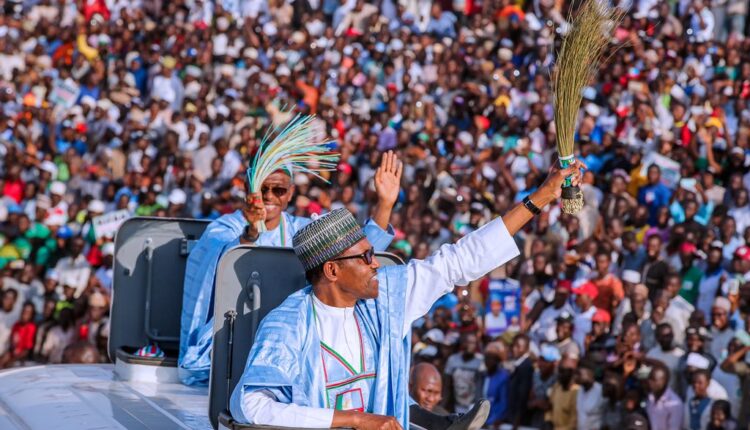Nigeria is dealing with more than just the death of a former leader in the wake of Muhammadu Buhari’s demise. It involves seeing the silent dissolution, or even the transformation, of a powerful political cult: a devoted group of more than 12 million Nigerians who viewed Buhari as a messianic figure and a moral role model.
During two election cycles, this base of support remained stable. They voted regardless of the weather, the state of the economy, or the level of national unrest. They defended. They had faith. The northern heartland found great resonance in Buhari’s image, which was austere, disciplined, and rooted in religion. He was more than just Mai Gaskiya, or “the honest one,” to many; he was Baba, a man of sacrifice, a reflection of their anguish, and a guardian of their dreams.
Who inherits this loyalty is the straightforward but important question at hand.
It would be an underestimation of Buhari’s emotional and symbolic appeal to think that these 12 million Nigerians will merely switch to the ruling APC or mindlessly follow the next northern contender. The party was never the only factor in his popularity. The topic was persona. No other politician from the north in recent memory has been able to garner as much praise as Atiku, Kwankwaso, or any of the present governors.
This vacuum is important.
Nigerian politics have frequently focused on “structures,” particularly since 1999. Buhari’s foundation, however, went beyond only structure. It was identity, sentiment, and memory. It created a powerful mystique by combining his combat experience, his alleged thrift, and his religious authority. The myth persisted even after his leadership failed. Hours were spent in line to cast their votes for that myth.
So, who enters that area now?
Bola Even though he currently controls Aso Rock, Ahmed Tinubu lacks the emotional clout Buhari possessed in the north. His political power is not found in mythology, but rather in mechanism. Despite his years of ambition, Atiku Abubakar has consistently fallen short of Buhari’s ability to build widespread trust in the north. Although Kwankwaso has a movement called the Kwankwasiyya, it is still regional in nature and more of a Kano cult than a northern one.
Could 2023’s unexpected force, Peter Obi, get traction here? Maybe. His emphasis on caution, anti-corruption rhetoric, and outsider status all harken back to early Buhari storylines. Obi’s ability to emotionally and culturally connect with Buhari’s constituency, which frequently associates political trust with common location, religion, and symbolism, is still up for debate. It might not be sufficient to have a few viral videos in the Arewa dialect.
Read Also: Urhobo Vanguard Condemns Sahara Reporters’ Report on PTI, Seeks Public Apology
In actuality, rather than a transfer, Buhari’s passing might signal the start of a political dispersal. His supporters may split apart, with some choosing to become indifferent, others forming new coalitions, and still others becoming conservative and filled with nostalgia as they wait for the next “pure” leader to come along.
The politics of 2027 may change as a result of this division. Northern votes might no longer be cast in unison if Buhari is not there as a unifying symbol. The terrain may suddenly be less predictable for power brokers who previously depended on Buhari’s reputation.
This presents Nigeria with both opportunity and risk.
Risk, since a lack of authority frequently encourages opportunism, dissension, and manipulation. However, there is also a chance to create a new politics based on principles, accountability, and ideas rather than personality cults.
However, the importance of emotional politics in Nigeria cannot be understated. Buhari’s legend might outlive both his administration and himself. Buhari’s legacy in the north may serve as a benchmark for many years to come, much like Awolowo in the southwest or Zik in the east. The difficulty for any successor is to command that same faith, not just to step into his shoes.
His 12 million supporters are currently politically orphaned. One of the most crucial issues in Nigerian politics today is whether they find a new home or end up becoming the decisive factor in the upcoming election.
Olu Allen, who lives in Kano, is a writer and teacher. He offers insights into Nigerian politics, society, and culture.
Hon. Dr. Philip “Okanga” Agbese, a transformative leader in Enone. Discover his achievements, community projects, and vision for 2027

